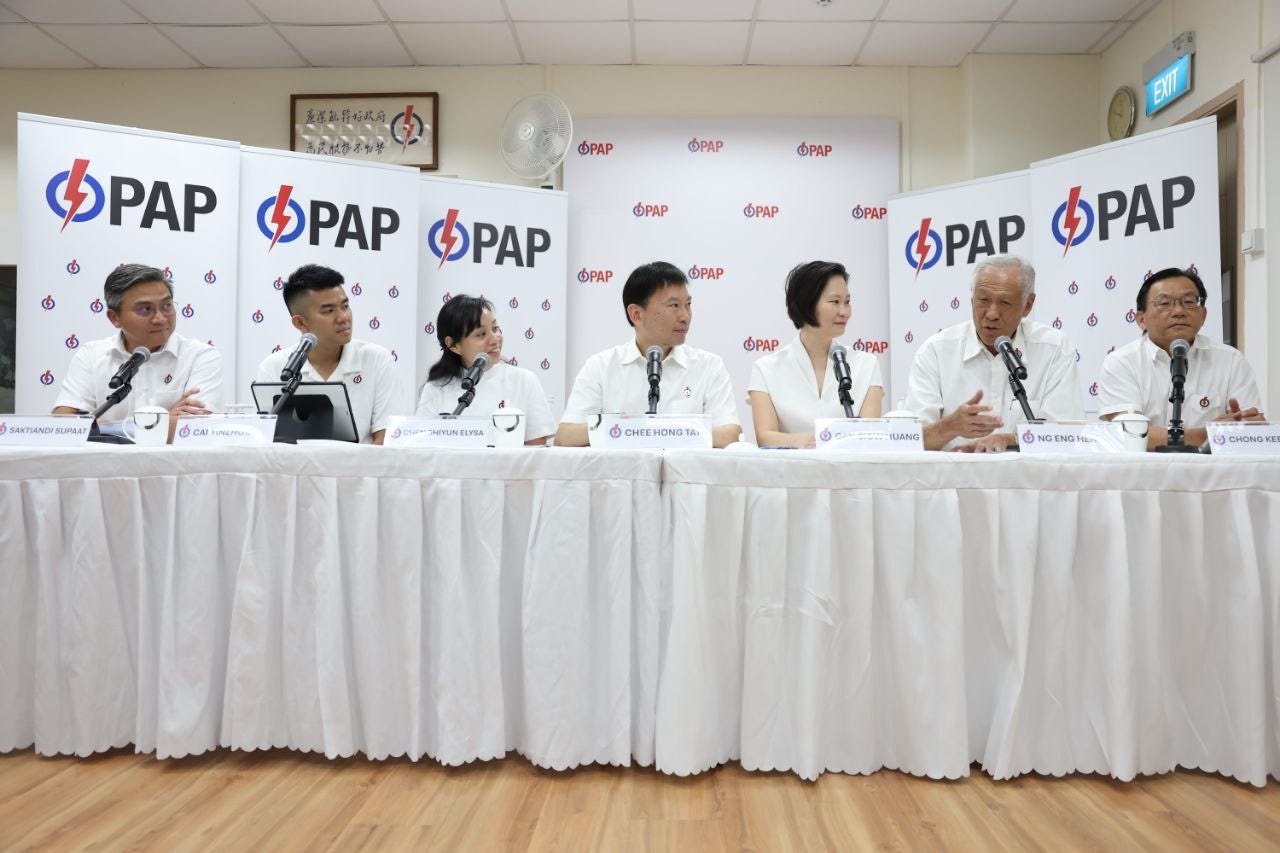Hi everyone,
Things have really heated up since the Writ.
Parliament was dissolved on April 15 and the timeline to the election has solidified, with Nomination Day on Wednesday and Polling Day on May 3.
This has triggered a huge wave of news as every political party and newsroom kicked into high gear.
So much information can be overwhelming. We will keep Unpacking to help you (and ourselves) cut through the noise.
On Nomination Day, candidates will have to finally lock in where they are standing. This will end the smoke and mirrors of the last few months.
The east and north-east are still shrouded in a fog of war. The most heated battles will be fought in these areas, where the two parties with the largest parliamentary presence are going head-to-head (PAP and WP, to be clear). Up till now, we aren’t sure who will stand in East Coast and Punggol – and strangely, Tanjong Pagar.
Things are clearer in the other parts of Singapore where the PAP and other parties have shown their hands.
In this issue, we’ll look at all the party manifestos so far, the WP’s unveiling of its new faces and potential PAP MP retirements:
Drop drop drop like grapes
The news: Manifestos have been dropping left, right and centre.
Of the big three, the PAP and the WP launched theirs on the same day, April 17. We also covered PSP’s manifesto launch two weeks ago.
The SDP, RDU and SPP also released theirs over the long weekend.
The take: We won’t wade into the weeds as each manifesto is lengthy and complex (though you should check out the ones relevant to your area!).
What you need to know is that each party spoke briefly about how they will run their campaigns and teased their election messaging ahead of the hustings.
The PAP’s manifesto is titled: Changed World, Fresh Team, New Resolve – Securing a Brighter Future for You (yes, it is a mouthful). It covers jobs, education, healthcare, et cetera.
As expected, many of its promises build on the Forward Singapore agenda – an exercise led by PM Wong.
The WP also unveiled a slogan: Working for Singapore. Its manifesto (with 125 policy suggestions) emphasised the party’s policy chops and growing parliamentary track record. It also claimed that 15 of its policy ideas, such as unemployment insurance and more shared parental leave, were eventually adopted by the government.
The PSP emphasised its track record as well. It presented over 60 policy ideas, many of which its two NCMPs had introduced in Parliament. Its tagline this year is Progress for All.
Lights, camera, action
The news: We’ve finally got 14 new candidates confirmed by the WP.
When it launched its manifesto, it also unveiled its first slate of new faces, aged 33 to 43 – former diplomat Eileen Chong, lawyer Alia Mattar, AHTC senior property manager Abdul Muhaimin Abdul Malik and tech start-up director Kenneth Tiong – sending a strong message of the party’s recruitment ability.
Abdul Muhaimin will go to Sengkang, while Tiong will go to Aljunied.
The party unveiled another 10 new candidates over the next three days. Where the rest will go is not clear, as the party has also not confirmed which constituencies it will contest.
Party chief and Leader of the Opposition Pritam Singh emphasised the importance of renewing the WP. He also said the party will not field enough candidates to achieve its medium-term goal of one-third opposition MPs in Parliament.
The take: The WP’s new faces, who have a mix of private and public sector experience, have generated some buzz.
Quite a few are young, bilingual professionals. This signals the party’s pull among PMETs – a group that it has started to do increasingly well with.
The party is also aware of past criticisms that it lacks candidates who can communicate effectively in Mandarin. It has brought that firepower this round, in addition to Tamil-speaking new face Paris V Parameswari.
But the WP has revealed fewer candidates than expected. Speculation was that it will contest 30 or 31 seats. With eight incumbent MPs and 14 new faces, this makes for a total of 22.
The party may decide to contest fewer constituencies than expected, or add experienced folk to make up the numbers for its slate.
So long, farewell, it’s time to say goodbye?
The news: About 20 PAP MPs are expected to retire ahead of the general election, though only six have confirmed it so far.
The biggest name to announce his retirement is Defence Minister Ng Eng Hen. Senior minister of state Amy Khor, and backbenchers Gan Thiam Poh and Chong Kee Hiong have also done the same.
Two first-term MPs are also stepping down: Chua Chu Kang GRC’s Don Wee and Ang Mo Kio GRC’s Ng Ling Ling. We expect more to go, but we might not know till Nomination Day.
The take: Based on recent history, the number of retirees is not out of the ordinary (20 in 2020, 15 in 2015).
What’s strange this year is that many have refused to confirm their departures from politics, even when their replacements have been introduced.
Examples include Potong Pasir’s Sitoh Yih Pin and West Coast’s Foo Mee Har.
While PAP backbenchers usually serve three terms before putting away the lightning badge, we’re also expecting to see a record number of first-term MPs stepping away this year.
All these cloak-and-dagger operations seem to be a way for the PAP to keep its final deployments flexible.
Three extra faces showed up in a picture featuring the PAP’s candidates during the party’s manifesto launch. Trade unionist Natasha Choy, lawyer Ahmad Firdaus Daud, and entrepreneur Mustaffa Kamal have not been in any constituency’s line-up so far. Could they be spares, or Nomination Day surprises?
After teasing several young new faces over the past few months, the PSP has returned to its tried and tested combination of chairman Tan Cheng Bock, party chief Leong Mun Wai and vice-chair Hazel Poa in West Coast-Jurong West GRC. Talk that either Leong or Poa would try to win an SMC seems to have fizzled out.
Could overseas votes matter in this year’s polls? This is the first time postal votes will count in a general election. There are 1,484 overseas voters in East Coast GRC, which is expected to be one of the tightest races. They account for nearly 1 per cent of voters in the GRC. Granted, no GRC margin has come that close in the past few elections but you never know!
As things heat up we’d like to Unpack a bit more. Look out for issues out of our usual Monday schedule.
We’re thinking after Nomination Day, as well as midway through the hustings. We’ll definitely have one after the results are in.
We also got another question from a reader this week (edited for clarity):
Is it unusual for PAP MPs to serve for only one term? Why is Don Wee not standing for GE 2025? No reason was given. Is it unusual for someone to go on a walkabout and then announce that he is not a candidate (Kawal Pal Singh)?
Yes, it is unusual, barring some sort of scandal. PAP backbenchers usually serve three terms, with some serving up to four or five. Political office-holders can go much longer (Senior Minister Lee Hsien Loong has been an MP since 1984).
We’re looking at a record number of first-term MPs stepping down this year, so there’s something definitely afoot. We will do more reporting on this, so watch this space.
On going on a walkabout and then not standing – it is unusual but not unheard of. Possible explanations: the candidate themselves decides not to stand; some sort of backlash behind-the-scenes or in public (à la Ivan Lim, although he was formally introduced); or simply a decision to field someone else.
This year, lawyer Kawal Pal Singh and trade unionist Natasha Choy were seen with PAP ministers but were later not formally introduced. Former NMP Raj Joshua Thomas also confirmed he had joined the PAP, but later announced he would not stand. LGBTQ activist and lawyer Deryne Sim was also seen in Nee Soon, but was later not fielded – following strong backlash from conservative groups. This tells us the PAP slate has been fluid right up to the last.
Also, observers have been telling us that the ruling party appears to have introduced possible candidates earlier this time around, possibly to float them to the public first to guard against later backlash or as part of the calculus in fielding them in the first place.
This could be a feature moving forward.














